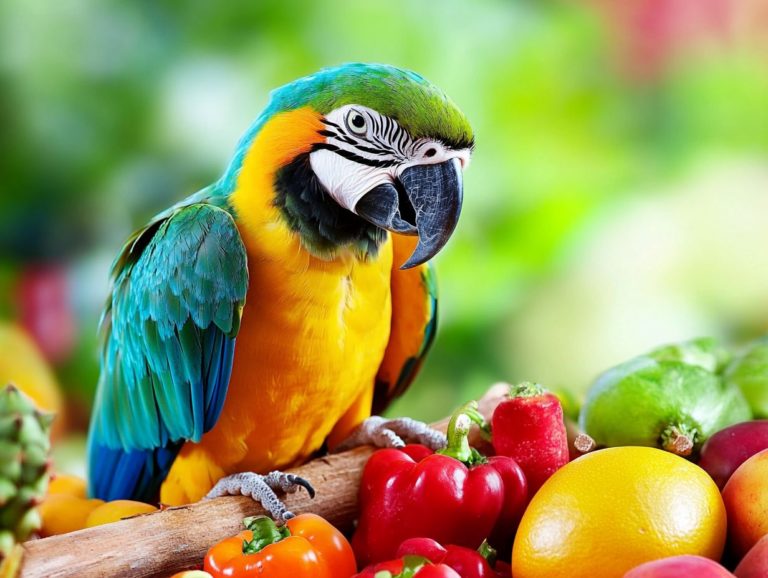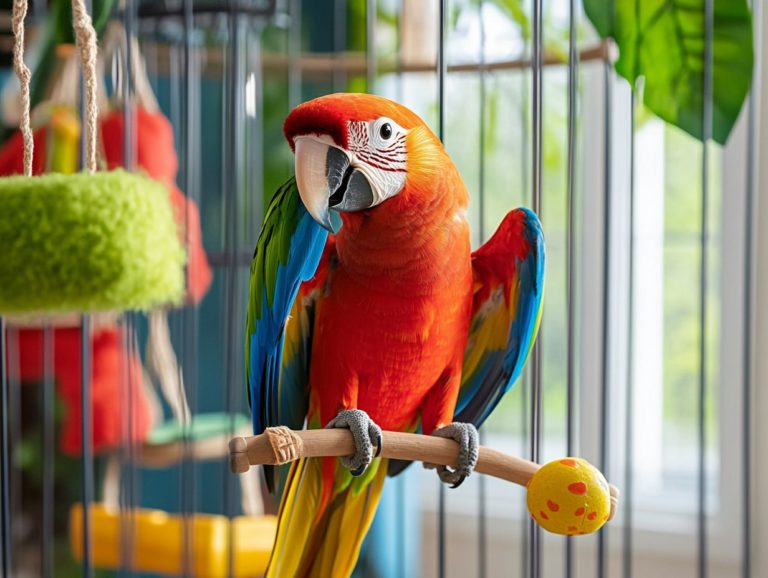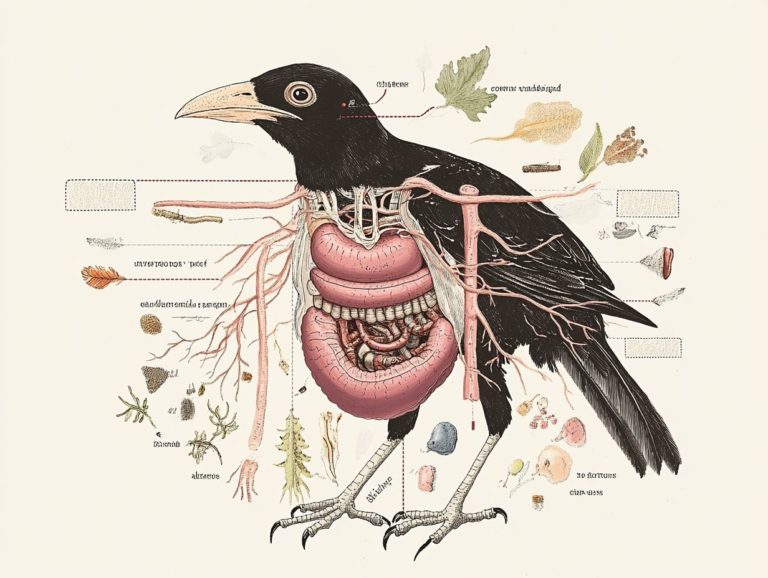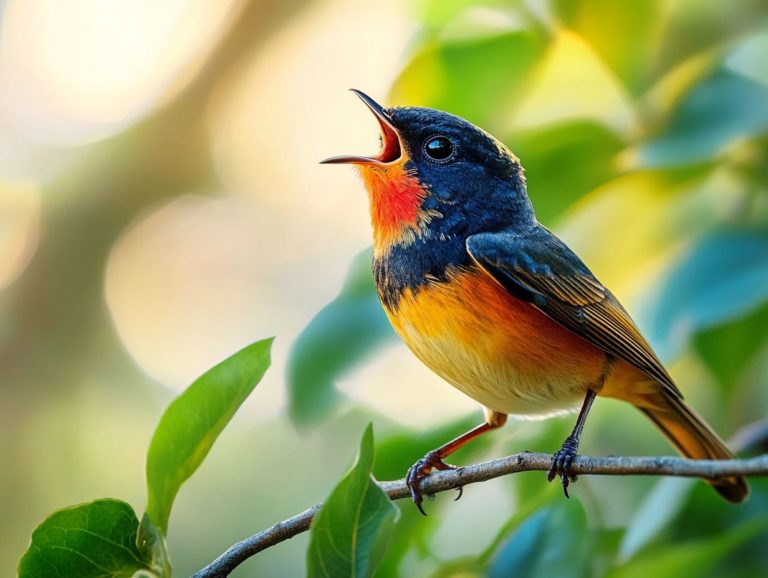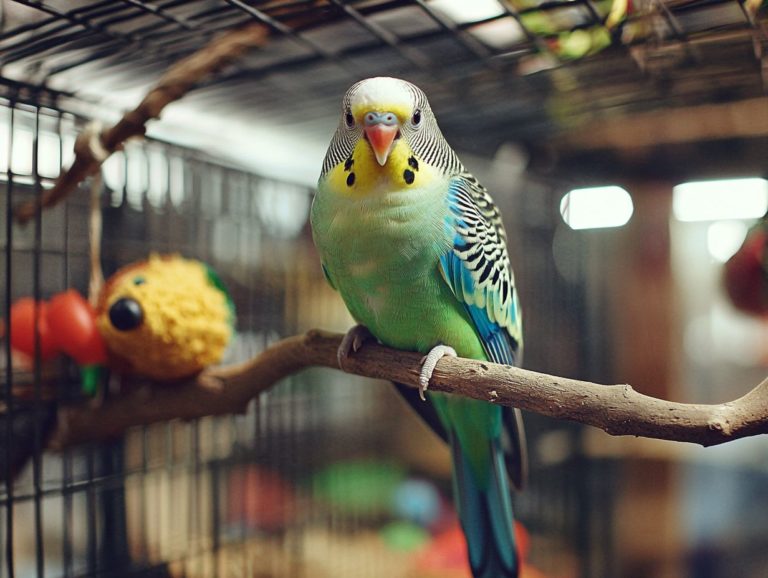How to Create a Balanced Diet for Your Bird
Ensuring your feathered companion receives the right nutrition is essential for their overall health and happiness, especially for pet birds that require a well-rounded diet.
With numerous diet options and various factors influencing their unique nutritional needs, navigating the world of avian care can feel daunting. This guide will help you create a balanced diet, focusing on essential nutrients, optimal meal frequency, and delightful healthy treats.
We will also explore how to monitor your bird’s diet effectively and recognize signs of nutritional deficiencies. Your bird deserves the very best let s ensure they receive nutritious bird food that meets their specific dietary needs!
Contents
- Key Takeaways:
- Understanding Your Bird’s Nutritional Needs
- Creating a Balanced Diet for Your Bird
- Feeding Your Bird
- Monitoring Your Bird’s Diet
- Frequently Asked Questions
- What is a balanced diet for a bird?
- Why is it important to create a balanced diet for my bird?
- What are the essential components of a balanced diet for birds?
- How often should I feed my bird and how much?
- Can I feed my bird table scraps and leftovers?
- Do I need to consult a veterinarian for help in creating a balanced diet for my bird?
Key Takeaways:
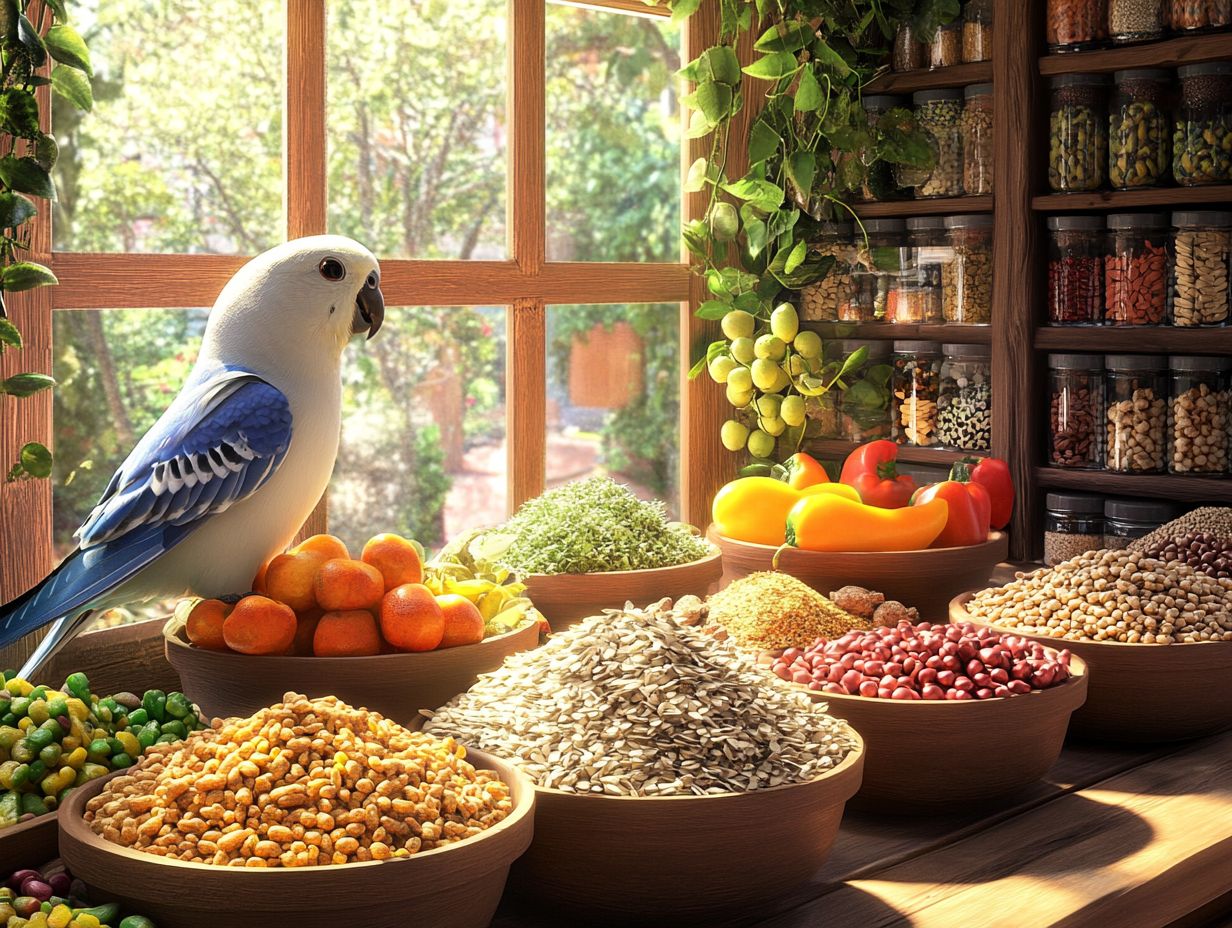
- Understand your bird’s nutritional needs based on its type and individual factors, including specific protein and fiber sources.
- Create a balanced diet by incorporating essential nutrients from various sources and following daily intake guidelines.
- Monitor your bird’s diet for signs of deficiencies and adjust as needed, including meal frequency and portion sizes, while offering healthy treats.
Understanding Your Bird’s Nutritional Needs
Understanding your pet bird’s nutritional needs is crucial for their health and well-being. A well-balanced diet is more than just bird food; it includes the specific nutritional requirements that vary across species.
For example, parrots, finches, and canaries each have unique dietary needs. Recognizing these distinctions can greatly impact their health and vitality. A solid understanding of avian nutrition helps you make informed choices about fresh foods, premium bird food, pelleted diets specially formulated foods providing a balanced diet and dietary supplements tailored to your feathered companions.
Types of Diets for Birds
A variety of diets are available for birds, each designed to meet their unique needs and preferences. Pelleted diets offer a well-rounded nutritional profile, while fresh foods like fruits and vegetables add both variety and essential nutrients. Understanding the importance of variety in bird diet can help ensure your feathered friends stay healthy and happy.
Choosing premium bird food often means selecting high-quality ingredients tailored to specific species, promoting longevity and vitality. While it’s tempting to lean towards a seed-based diet, be aware of potential drawbacks, like deficiencies in crucial nutrients.
By incorporating a blend of seeds, fresh fruits, and vegetables, you enrich your bird’s diet and cater to their natural foraging instincts. Recognizing the importance of food variety helps maintain optimal health, prevents boredom, and encourages lively behavior in your feathered companions.
Factors Affecting Nutritional Needs
Several factors can influence a bird’s nutritional needs, including age, activity level, and overall health. For instance, younger birds and those in breeding phases typically require higher protein sources and healthy fats to support their growth and reproductive health.
A bird s metabolism plays a crucial role in determining how much and what type of food is necessary for optimal health. As birds age, their metabolic rates tend to decline, leading to lower energy requirements. You may need to adjust their dietary supplementation accordingly.
Active birds that engage in frequent flight or vigorous activities will likely need more calories and a variety of protein sources to sustain their energy levels. By understanding how these factors connect, you can better tailor diets for your feathered companions, ensuring they receive adequate vitamins, minerals, and amino acids for both their immediate health needs and long-term vitality.
Creating a Balanced Diet for Your Bird
Crafting a balanced diet for your bird is essential for their overall health and wellbeing. For guidance, consider how to create a bird-friendly diet plan, which requires thoughtful attention to the important vitamins and minerals your bird needs.
A well-rounded diet should include a variety of foods, such as fresh fruits like apples and mangoes, vibrant vegetables like broccoli and carrots, and high-quality bird food tailored to their dietary needs.
Incorporating dietary supplements like Nutri-Berries and Avi-Cakes can help fill any nutritional gaps. This ensures that your feathered friend will truly flourish!
Essential Nutrients and Their Sources
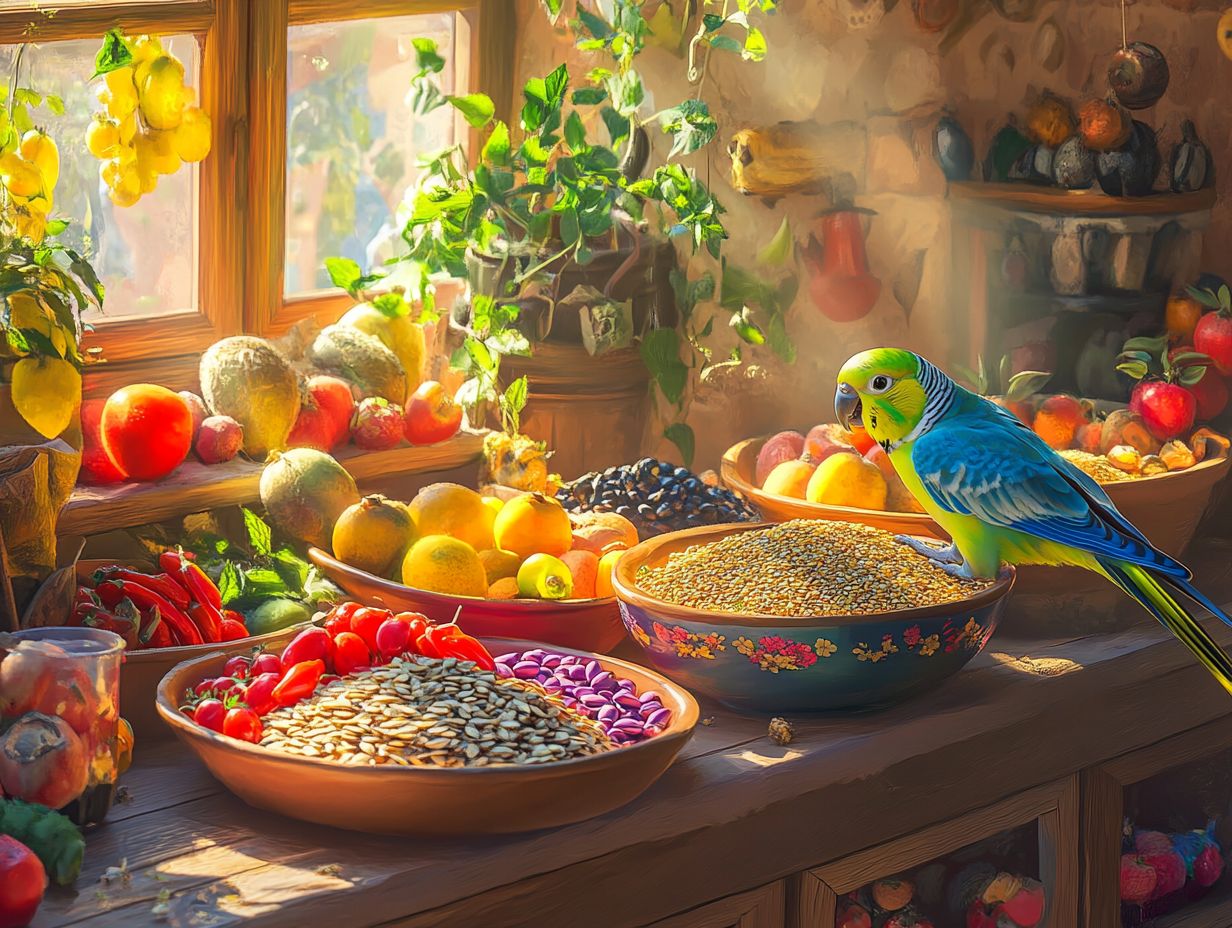
Essential nutrients for birds include vitamins, minerals, omega-3 fatty acids, protein sources, and healthy fats. These are vital for their growth, energy levels, and overall health.
Foods like nuts, fruits, and vegetables are excellent sources of these nutrients, ensuring your feathered friends enjoy a fiber-rich diet that promotes digestive health.
Incorporating seeds such as flaxseeds and chia seeds into their diet significantly boosts their omega fatty acid intake, which is essential for healthy feathers and skin.
Potassium-rich foods like bananas and leafy greens support heart health, while a variety of fruits provide antioxidants that strengthen the immune system.
By ensuring your birds receive a balanced intake of these nutrients, including vitamin A, vitamin C, and omega-3 fatty acids, you play a vital role in enhancing their well-being. This ultimately improves their vitality and longevity.
Recommended Daily Intake
Determining the recommended daily intake for your bird is crucial for maintaining their health and vitality. Portion sizes can vary significantly based on size and species, so consider several factors.
Think about the type of food, including healthy treats like peanut butter, your bird’s age, and their activity level when establishing feeding habits. This ensures they enjoy a nutrient-packed meal every day.
Like humans, birds have unique nutritional needs that change as they age. For example, young birds often require higher protein levels to support their rapid growth, while older birds may benefit from a diet lower in fat and sugar to help prevent obesity.
It’s essential to tailor the food type based on your bird’s species. Some thrive on seeds, while others do better with pellets or fresh fruits and vegetables, including mangoes and apples.
Regularly monitoring your pet’s weight, behavior, and overall health will enable you to adjust portions and food types, ensuring they develop healthy, lifelong eating habits.
Feeding Your Bird
Feeding your bird properly involves more than just choosing the right types of food. You must consider meal frequency, portion sizes, and the importance of food variety to ensure they receive the nutrition they need.
Establishing regular feeding habits helps maintain stable energy levels and supports overall bird health. You can also introduce healthy treats, such as nuts like almonds and walnuts, and fruits to enhance their diet.
Incorporating bird toys encourages foraging behavior and adds delightful variety to their feeding routine, making mealtime an engaging experience for your feathered friend.
Meal Frequency and Portion Sizes
Establishing the right meal frequency and portion sizes is vital for keeping your bird healthy and happy! Birds thrive on routine, so providing consistent meal times helps regulate their feeding habits and ensures they consume the right amount of food.
Portion control is also key. A balanced diet requires careful attention to how much food is offered. To determine the ideal feeding schedule, consider the species, such as parrots, finches, and canaries, along with your bird’s age, as each has unique dietary needs. For more detailed guidance, check out what should I include in my bird’s diet?
For example, small birds may benefit from multiple small meals throughout the day, while larger species might thrive on fewer, more substantial feedings. Pay attention to signs of hunger or disinterest in food; these could indicate that adjustments are needed.
Incorporating a variety of foods like pellets, seeds, fruits, and vegetables ensures your birds get the essential nutrients they need. Additionally, keeping your bird healthy and happy involves regularly monitoring their weight and overall health, which will guide you in making necessary adjustments to meal frequency and portion sizes, promoting optimal health and vitality for your avian companions.
Healthy Treat Options
Offering healthy treat options, including fruits and nuts, is an excellent way to elevate your bird’s diet, adding variety and enrichment to their feeding routine. Healthy snacks like almonds, walnuts, and fresh fruits not only make delightful rewards but also provide essential nutrients that support your bird’s overall health.
By incorporating these dietary supplements, such as omega fatty acids and fiber-rich foods, through treats, you re fortifying their nutrition and promoting their well-being!
Introduce vegetables like carrots and leafy greens, rich in potassium, to broaden their palate and deliver beneficial vitamins. Carrots are rich in beta-carotene, crucial for eye health, while leafy greens significantly enhance digestive function.
Dried herbs and seeds, like flaxseed or chia seeds, also bring omega fatty acids into the mix, which can improve skin and feather quality. Curating a balanced assortment of these wholesome treats ensures your bird enjoys a vibrant and nutritious diet, fostering both physical health and mental stimulation.
Regularly rotating treat options will keep their meals exciting, reinforcing healthy eating habits and making mealtime a delightful experience!
Monitoring Your Bird’s Diet
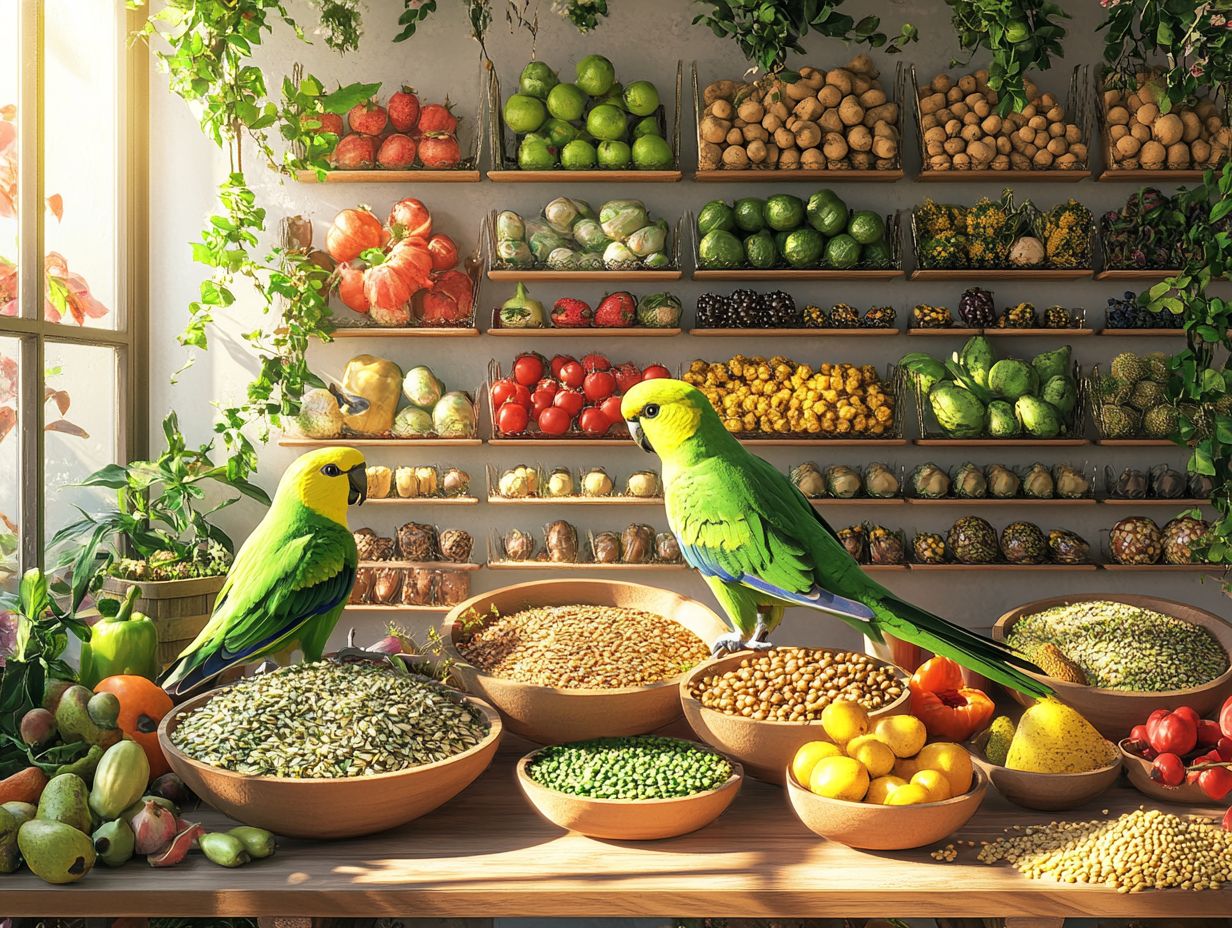
Monitoring your bird’s diet is a crucial part of being a responsible bird owner. It helps you spot any potential nutritional deficiencies and make necessary adjustments to their diet.
By regularly evaluating their feeding habits and overall health, you can gain valuable insights into whether they’re enjoying a well-balanced meal plan.
Recognizing the signs of nutritional deficiencies enables you to tackle any issues proactively, ensuring your bird remains healthy and vibrant.
Signs of Nutritional Deficiencies
Recognizing the signs of nutritional deficiencies in your birds is essential for ensuring their well-being and extending their lifespan. Look out for common indicators like feather plucking, lethargy, and a general decline in health, as these can be telltale signs of an inadequate diet.
Consulting with an avian veterinarian can offer valuable insights into your birds’ specific nutritional needs and help identify potential issues before they become serious.
Other symptoms to watch for include poor feather condition, an abnormal beak appearance, and a noticeable lack of energy during their typically active moments. These changes can profoundly affect your bird s quality of life and long-term health, making it crucial for you to stay alert and attentive!
A balanced diet is the cornerstone of healthy feather production and optimal energy levels. Regular veterinary check-ups are essential for assessing dietary adequacy and making necessary adjustments, ensuring your avian companions receive the nutritional needs of aging birds to thrive in vibrant health and enjoy a long, happy life.
Take action today and assess your bird’s diet to ensure it’s balanced!
Adjusting Diet as Needed
Adjusting your bird’s diet is crucial for its health. Changes in feeding habits, activity levels, or health status may require immediate dietary adjustments to guarantee your bird receives the nutrients needed for thriving. Regular assessments help you make informed dietary decisions.
Watch for signs like increased lethargy, feather deterioration, or shifts in vocal patterns; these can indicate that dietary changes are necessary. For instance, a drop in energy might mean your bird needs more protein-rich foods, while dull feathers could suggest a lack of healthy fats that are important for your bird s coat.
Incorporating a variety of fruits and vegetables not only boosts vitamin intake but also makes mealtime exciting, encouraging your bird’s natural foraging instincts. By monitoring their activity level and overall demeanor, you can proactively implement dietary changes that promote long-term well-being and vitality.
Frequently Asked Questions
What is a balanced diet for a bird?
A balanced diet for a bird includes various healthy foods, and how to create a feeding schedule for your bird can help ensure all necessary nutrients for overall health.
Why is it important to create a balanced diet for my bird?
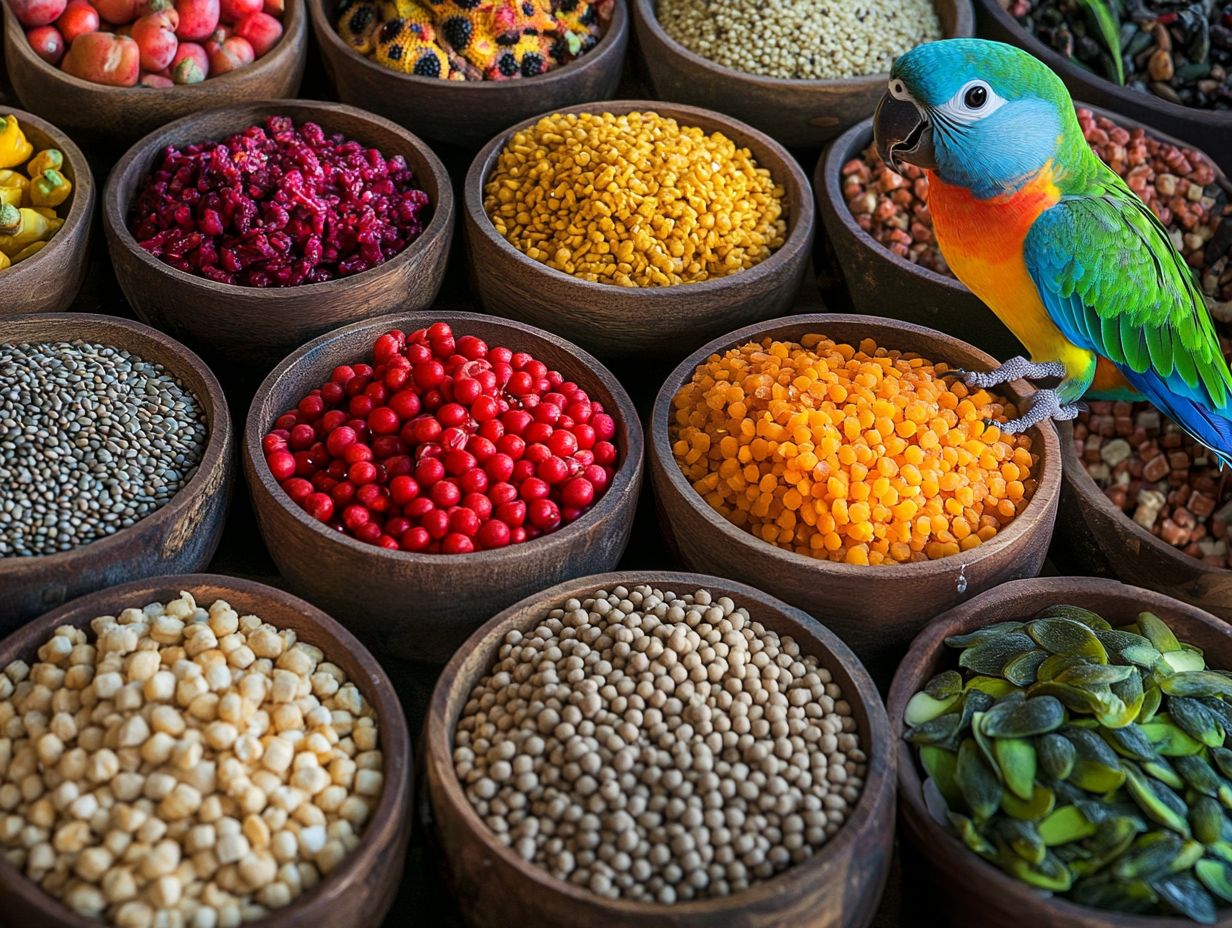
A balanced diet helps maintain your bird s immune system and prevents health issues.
What are the essential components of a balanced diet for birds?
A balanced diet for birds should include high-quality pellets, fresh fruits and vegetables, and occasional treats like seeds and nuts. It’s important to note that the benefits of a varied diet for pet birds also ensure they receive enough protein, carbohydrates, healthy fats, and calcium.
How often should I feed my bird and how much?
The frequency and amount of food depend on your bird’s species, size, and age. Generally, birds should have access to fresh food and water at all times, with a portion size of about 1-2 tablespoons per day.
Can I feed my bird table scraps and leftovers?
No, it is not recommended to feed your bird table scraps and leftovers, as they may contain harmful ingredients or seasonings that can be toxic. Stick to fresh, bird-friendly foods.
Do I need to consult a veterinarian for help in creating a balanced diet for my bird?
Yes, it is best to consult a veterinarian who specializes in avian health for guidance and advice on creating a balanced diet. They can provide recommendations based on your bird’s age, breed, and health conditions, as well as help you understand your bird’s dietary habits.

